Last week, thirteen young teenagers and their English teacher took a coach from Hull to the University of York. What happened next will amaze you.
(How am I doing for buzzfeed-like academic blogging?)
What happened next for the students of Kelvin Hall was an afternoon of creative writing in the company of 2nd-year undergraduates, all enrolled in the Children and Literature module of the Education degree.
The group was composed of the most enthusiastic young storytellers and writers from Years 7-9 in the school – and the point was to get them to write, with the help of undergraduates who’d been taught for two terms about children’s literature in theory. This was an opportunity to interact in practice with actual young readers and producers of texts.
Each undergraduate was paired with one of the Kelvin Hall students (by some favourable twist of fate, they were in equal numbers) and the writing started…
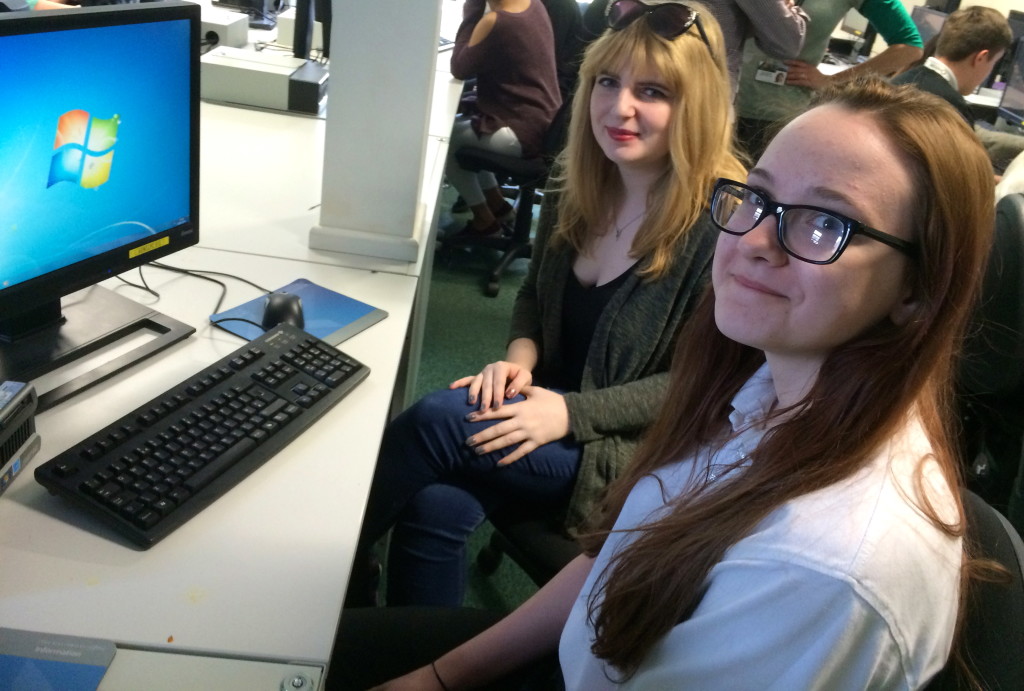
They looked optimistic at first. Maybe it sounded like it was going to be easy.
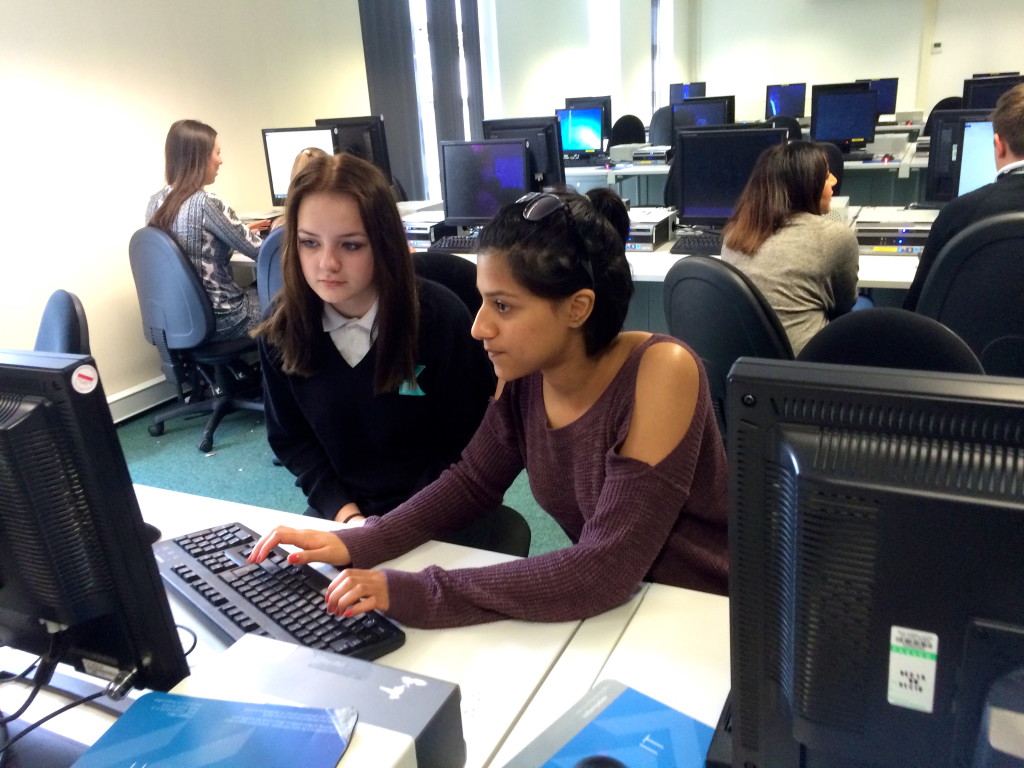
It wasn’t. (They looked happier at the end, though, I promise. This is their concentration face.)
The event had been organised by Amanda Naylor, who lectures that module at York, and by Ryan Eskrett, who teaches the children at Kelvin Hall. Two other English in Education lecturers, Nick McGuinn and me (Clementine) were there to help set up some of the writing activities.
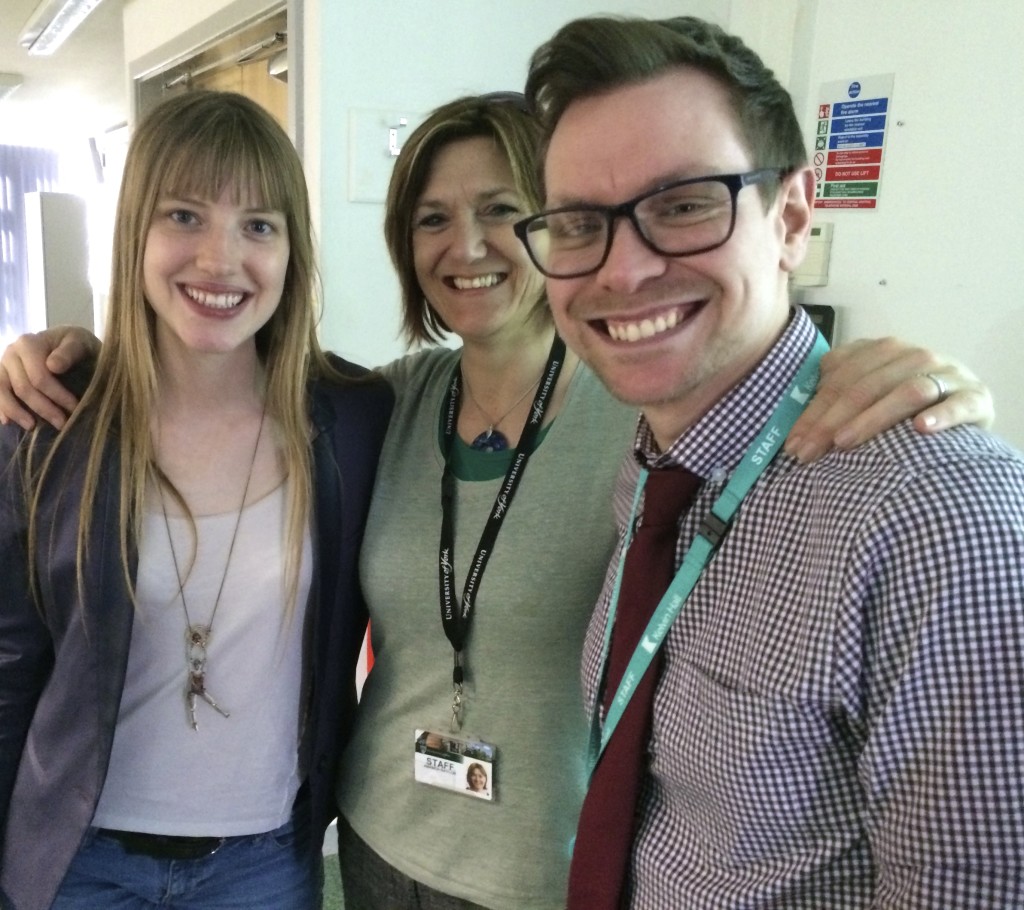
Me, Amanda and Ryan. Nick isn’t on the picture because he was taking it, but as I realise now, clearly the true reason was that he wasn’t wearing a long-necklacey-thing likethe rest of the gang.
We got them to write flash fiction, which, in case you don’t know, is like short stories, but shorter. Like, really much shorter, we’re talking a story that’s as long as… No, no, not that long. No, really, even shorter. Almost there… Yep. Exactly.
Flash fiction is a really interesting kind of text to write because it forces you to condense into a very small space all the central ingredients of an actual story: characterisation, narrative arc, atmosphere, distinctive style. It’s hard. Anyone can be a novelist, but you have to a pretty good writer to write flash fiction.
To get into the mood, we started with the famous 6-word-memoir: your life, in six words or less.
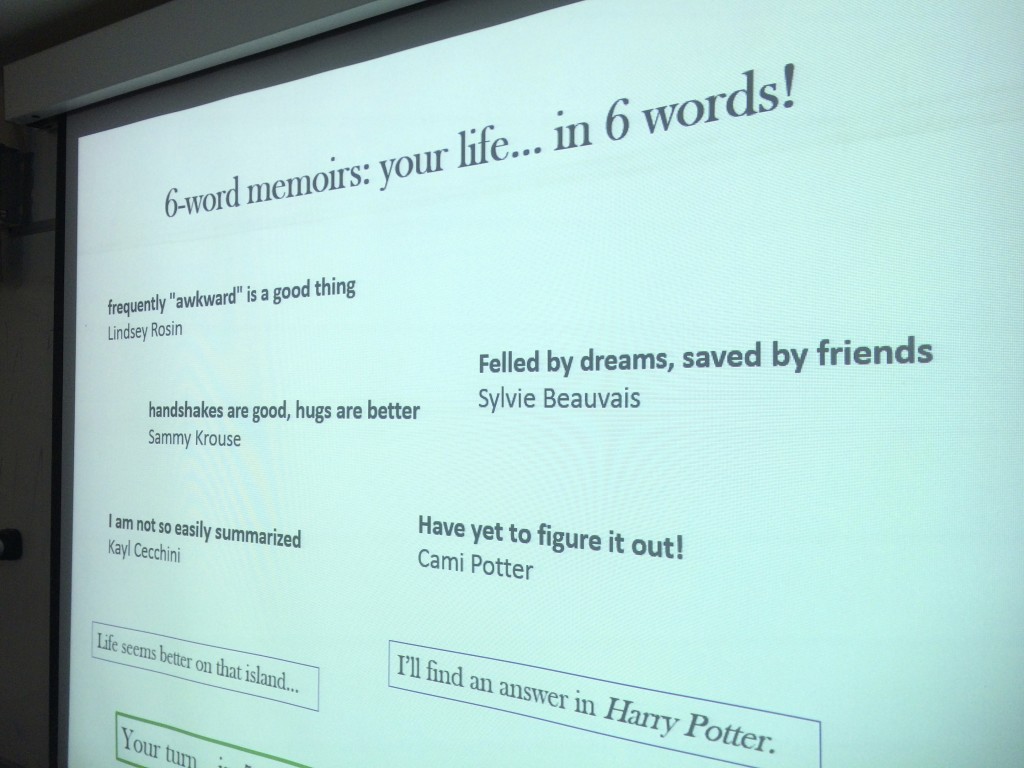
Before you start accusing me of PowerPoint nepotism, I should specify that I have no idea who Sylvie Beauvais is, but she happens to write flash fiction.
Now, to be fair, one would expect that the younger you are, the easier it is to pack your life into six words. Presumably, a two-second-old child could just write ‘Born,’ and that would be about it (though it would doubtlessly trigger some media interest). But the undergraduates and high school students had apparently got much more to say than Ryan (‘Marking. Eat. Sleep. More marking’, was, I think, his memoir) or than myself (‘Still not writing real literature, sorry’):
A cocktail of strange and boring.
Maturely developed peculiar sample of youth.
I love coffee, coffee is life
(Bit concerned that a young teen should be drinking so much coffee already, but at least it’s not whiskey, I guess.)
Then, for the remaining hour and a bit, the Kelvin Hall students and our second-years worked on an actual flash fiction story – less than a page, for some less than half a page.
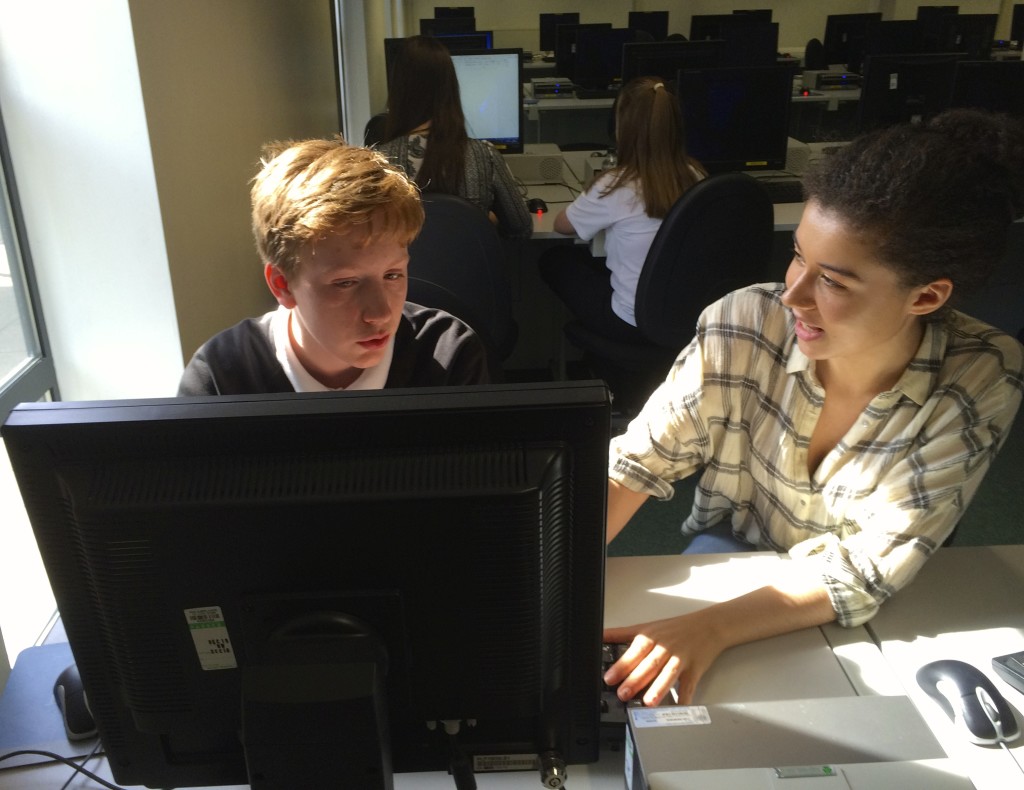
This picture is so picturesque I’m kind of worried about putting it online as it will doubtlessly be used by every university in the world in every single undergraduate handbook forever.
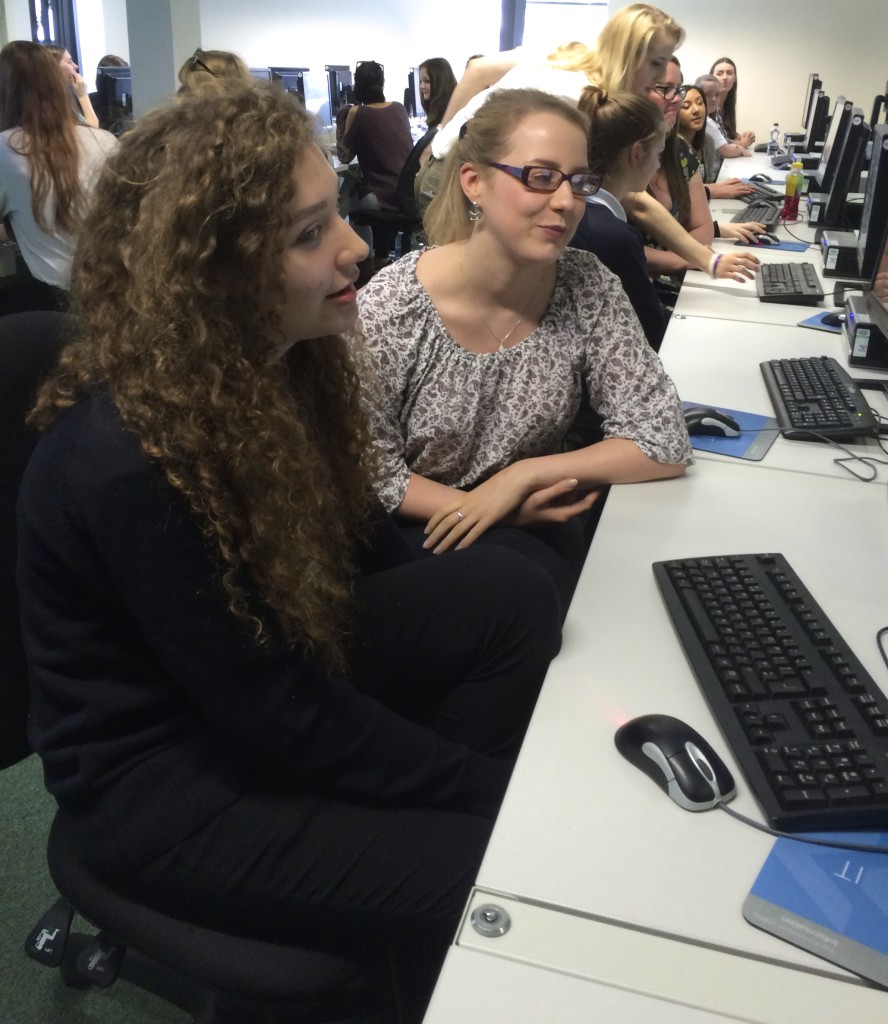
Thinking of things to write about (with a photographer on your right and an undergraduate on your left; but no pressure)
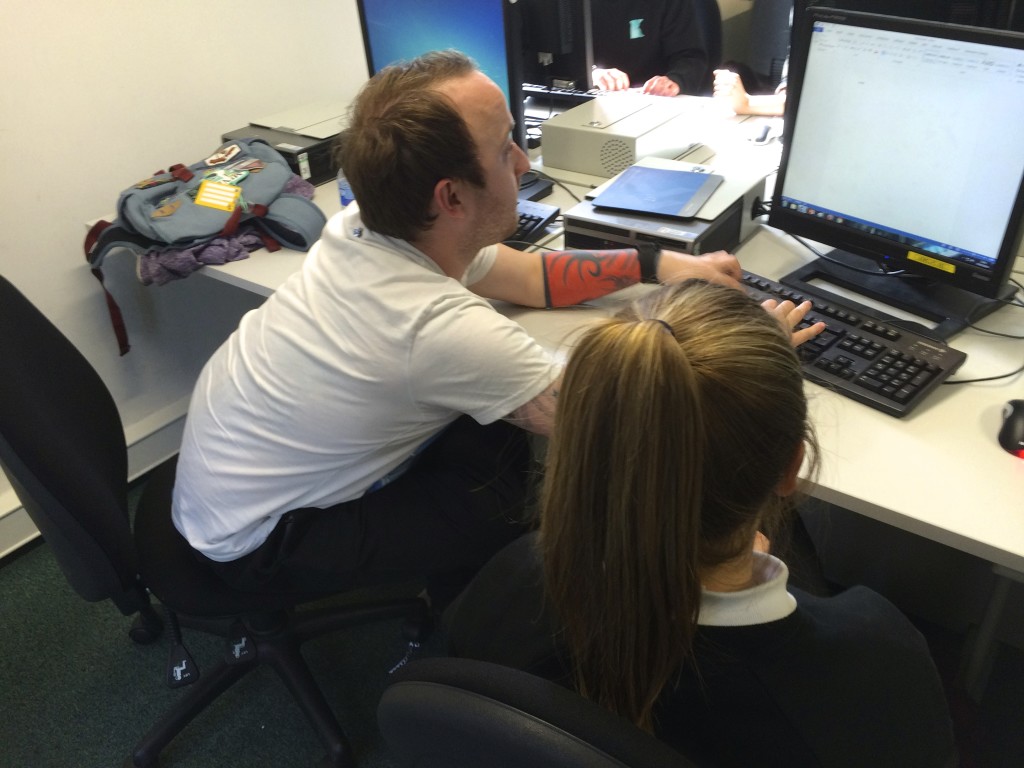
Pretty much what I’d like my life to be like: reclining on a comfortable chair while a nice young person types up my stories into a Word document.
At the end of the afternoon, each Kelvin Hall student had their own flash fiction story printed, and both groups seemed delighted with the experience. Amanda and Ryan’s idea of bringing high school and higher education students together was brilliant: original, fruitful, fun, and remarkably easy for the three of us as we just sat in the back of the class and talked about academisation while they worked.
Here’s a particularly spooky and atmospheric example of flash fiction, by Axel:
Thursday, 5th 1901.
Dear journal,
After investigating the manor in which my young brother, Marcus, vanished I found myself close to death (or worse). The manor which housed my loving sibling which is upon the Quaking Mountain that, I have uncovered, houses an insidious force. This hideous goliath resides within the terrain of the mountain which explains why it constantly shakes. This horrendously coloured colossus has a disturbing amount of extremities and an unearthly amount of voices, whispering.
I’ve learnt from the remains of my dearest brother and thousands of other small remains that this beast expels acidic vomit upon it’s hostages to devour its prey. The manifestation of pure malevolence calls itself ‘Eloth’. This crustacean-like being rasps horrific yet interesting conversations which echo through the cave, bouncing of the rocky walls. It’s dark in here but overtime my eyes have adjusted to this darkness. I can see the waxy remains of my brother staring back at me.
The creature is currently singing me a lullaby in its unknown language, in a way it is ethereal, I’m feeling the need to rest…
Disturbing amounts of extremities, horrific yet interesting conversations, acidic vomit: sounds uncannily like those parties after academic conference dinners. Interestingly, the students chose very many different genres to tell their stories, from diary entries to letters to tales to prose poetry. Flash fiction is very modulable, and the groups were extremely imaginative and open-minded in their choices.
This is just a little window on the kind of thing that goes on in universities, alongside all the life-saving, paradigm-shifting, Ted-talk-worthy things you hear about on the news. In-between all the big, muscular, über-funded customised random trolls – sorry – randomised controlled trials – there’s daily, small-scale, zero-budget events, involving local communities and real people – enthusiastic teachers and academics, motivated undergrads, keen children.
And while they won’t feature on The Conversation, they stick in individual memories and bring a little bit more good to the world. That afternoon in the computer lab of Alcuin College, University of York, thirteen new stories were born.
Thank you Amanda and Ryan for setting up the event, and Nick for the pictures! Thank you also to the children and their parents who have given their permission to be featured on the pictures in this blog post, and to Axel for the stories.
